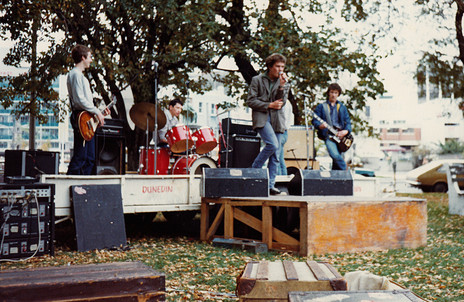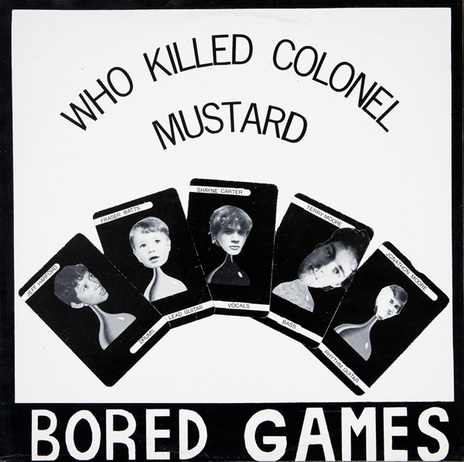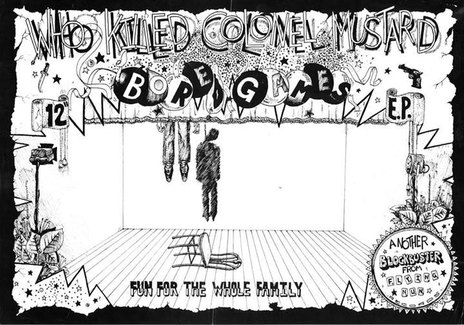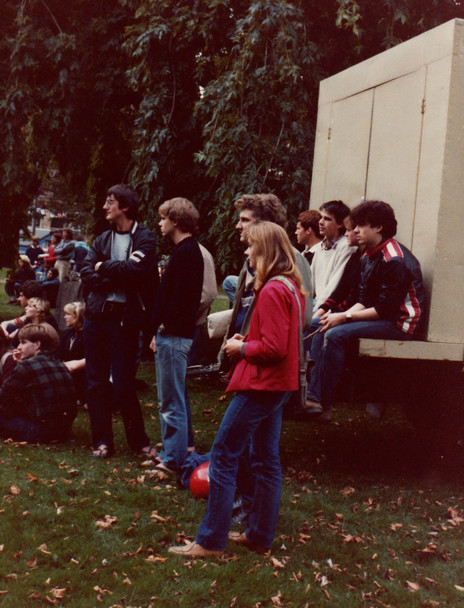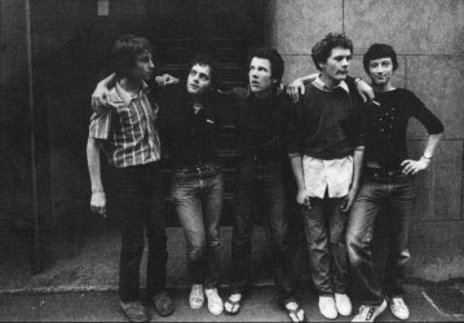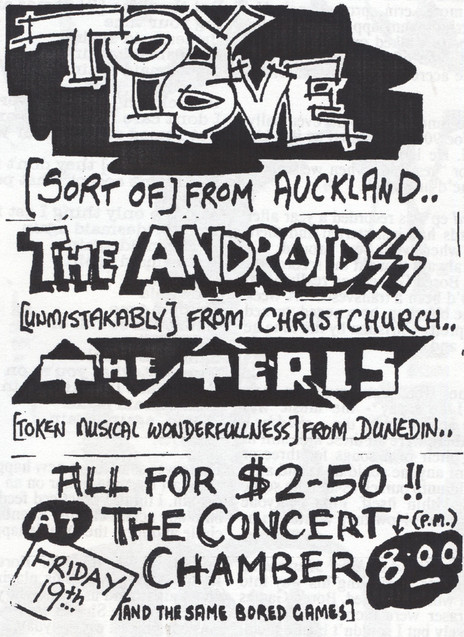The band debuted at the school talent quest in 1979. Forty years later Carter described the scene in his memoir, Dead People I Have Known: “We plan to stick it to them from the top,” wrote Carter.
“Fraser smacks down on the opening chord of ‘I Wanna Be Your Dog’ before the curtain even moves, and by the time it’s shovelled over he’s already down to E. The rest of the band trundles in, the trailer behind his truck.
“Ted, my little sister’s teddy bear, is tucked beneath my arm. I’d planned to use Ted as an ironic prop, but from the opening note his days are numbered. Within the first minute he’s been torn limb from limb and scattered across the stage. My 7-year-old sister looks on from her seat, horrified ...
“It’s hardly what the crowd expects. It gets worse in the so-called chorus, where one line is repeated until it becomes clear that what you think is being said is actually being said.
“Now I want to be your dog! Now I want to be your dog!”
Bored Games subsequently played support to Toy Love, a group that – along with Chris Knox’s previous group The Enemy – proved to be a prime influence on the fledgling Carter.
Bored Games lasted only 18 months, splitting in mid-1981, a seminal band in the early history of the Flying Nun label.
A METAL SINGER PUNCHED CARTER OUT AFTER COMING SECOND TO BORED GAMES IN A TALENT QUEST.
A classified newspaper ad brought two other like-minded teenagers to the band – guitarists Fraser Batts and Jonathan Moore – and saw the departure of Gavin. The group originally came together in early 1979, with Carter on vocals, Wayne Elsey on bass, Jeff Harford on drums, and – wrote Roy Colbert in a posthumous profile in the 6 November 1982 Listener – “a guitarist called Gavin, whom Carter recalls as being awful – ‘he made up all his own chords’.”
When Elsey defected to The Stones in 1981, Terry Moore (no relation to Jonathan) joined briefly on bass before defecting with Batts to The Chills later that year.
A year later, this line-up posthumously recorded Bored Games’ one 12-inch EP, Who Killed Colonel Mustard, with $200 provided by the nascent Flying Nun label. Featuring the deliriously catchy ‘Happy Endings’ and the classic punk thrash of ‘Joe 90’, it’s a minor gem. A striking video of ‘Happy Endings’ – filmed by veteran TVNZ cameraman Peter Janes – is almost monochromatic, concentrating mostly on Carter performing intensely in front of a leadlight window. The opening credits played on the board games pun, spelling out the details in Scrabble pieces.
Carter was confident – pugnacious, even – about Bored Games’ abilities. “We were sickened by some of the things that were getting on record from further north,” he told Colbert. “We felt we had much better songs and we also wanted something to show for over two year’s slog.”
Part of the difficulty the band encountered was finding places to play: most of Bored Games were aged just 15 or 16; even Terry Moore, aged 19, could not drink in a pub legally. In the 27 months the band existed, it performed just 25 times.
Carter, already a raconteur, described to Colbert a Spinal Tap-array of incidents in the band's short career. Having pulled out of a 1980 battle of the bands, they won their heat in 1981, beating a heavy metal band. The metal band’s singer punched Carter out later that night. “He wanted to know how many weeks I’d been playing for. He said he was a professional musician and had been to the North Island.”
Bored Games didn't make the finals. Demo tapes sent to Mike Chunn in Auckland didn’t receive a reply; a couple of videos made for Droppa Kulcha were never shown (no episodes of the TVNZ music series still exist); and the band blew out a support gig for Auckland band Lip Service when Batts’s father said he couldn’t perform in a pub. So Bored Games didn't show up.
Colbert described Carter being, on a good night, “a precocious amalgam of Chris Knox, Pete Shelley and Johnny Rotten.” Their frenetic sets consisted mostly of original songs, though one exception stood out: the night Bored Games supported Toy Love at the Concert Chamber, “and delivered a version of ‘Pull Down the Shades’ which made a mockery of Toy Love's own.” Knox, usually never short of a comment, “could only stand and gape.”
“We broke up out of frustration,” Carter told Colbert. “We were tired of seeing the same old faces when we played, and we usually had to organise the dances ourselves as we couldn’t play in pubs. We had no money to get out of Dunedin, and we were still at school anyway.”
ON A GOOD NIGHT, CARTER WAS LIKE “A PRECOCIOUS AMALGAM OF CHRIS KNOX, PETE SHELLEY AND JOHNNY ROTTEN.”
Reviewing the Colonel Mustard EP in Rip It Up, Jewel Sanyo said: “Buy this record and shed a tear for the fallen flower of Dunedin power pop who disbanded a year ago. ‘Happy Endings’ and ‘Joe 90’ should secure them some immortality. The band have real presence on vinyl with powerful, husky vocals and a bassy rock’n’roll sound. I suspect the recording doesn’t do Bored Games full justice. Were the controls ever turned over halfway? No matter – dancey, hand clapping ‘Joe 90’ will romp away with your feet.”
Colbert saw the EP as “a fine representation of the band – four of their best songs, tightly played, and mixed with rock and roll radio firmly in mind. One doubts if there has been a more accessible release for the Joe 90s Carter sings about in the Flying Nun catalogue so far – and that has been achieved without losing one whit of the band's on-stage power.” (Who Killed Colonel Mustard was reissued by Flying Nun for Record Store Day in April 2014.)
Colbert concluded his 1982 profile of Bored Games with a prescient comment: “Carter, possibly too abrasive to be accommodated in the continual cross-pollination that has gone on in the young Dunedin bands these past 18 months, has been fiddling with guitars and talks of having a new band soon. The chief writer in Bored Games and a great singer/performer, Carter will surely re-surface before too long. He is, after all, only 18.”
--
Read more: Shayne Carter on Bored Games
Original stub written by Gary Steel
